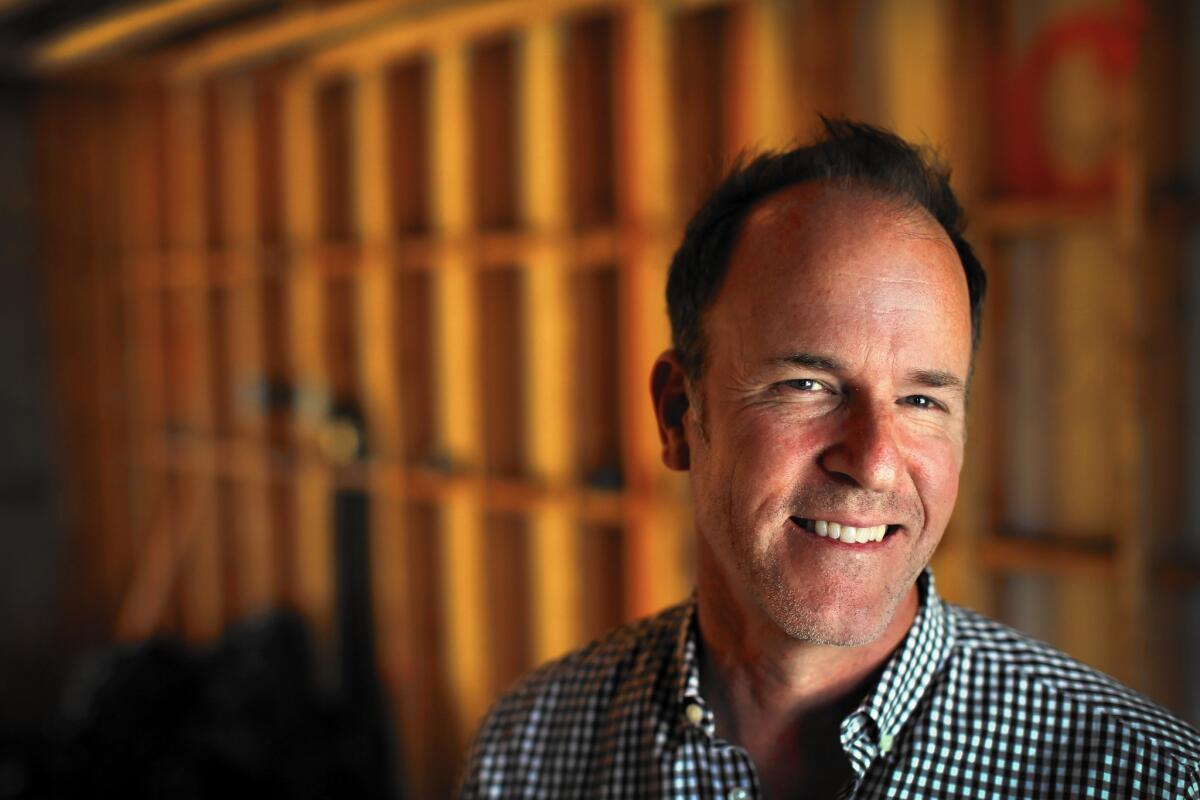How I Made It: Developer Michael Marini has big ideas for small lots

- Share via
The gig: Michael Marini, 49, is chief executive of Planet Home Living, one of the leading developers of small-lot subdivisions — clusters of townhome-like single-family houses that are only inches apart from each other. The sleek, modern developments have proved extremely popular among Los Angeles home buyers in recent years, particularly in the high-demand neighborhoods of Echo Park and Silver Lake, where there’s little for-sale housing being built. Lists of those interested in the Newport Beach firm’s projects are in the hundreds, Marini said. And he’s currently under construction or about to start work on nine developments, eight of which are small lots. “Never been busier,” he said.
An early start: Construction has been a constant in Marini’s life from the beginning, starting with “building blocks and Legos,” he said. “I always had a passion to build things.” Marini grew up in Agoura Hills and recalls riding his bike to the nearby home sites going up in a growing Conejo Valley. Construction workers would let him get his hands dirty, and instead of pay, they’d reward him with “a burrito and Sunkist off the lunch truck.” In high school, when he wasn’t surfing over the hill at Zuma Beach, Marini worked for his father, an electrician, “digging ditches and wiring houses.”
Foot in the door: After graduating from UC Irvine in 1989 with a degree in civil engineering, Marini got a job at a local structural engineering firm, where he worked with large developers such as Kaufman & Broad. He eventually landed a gig with Olson Co., a Seal Beach-based home builder that focuses on urban infill projects in Southern California.
Turning points: In the mid-2000s, he managed a major loft project in downtown Long Beach for Olson but grew frustrated because he wanted to push the design further than his employer did. Afterward, he said, he became a “design guy” at corporate, where he worked to make Olson’s housing developments shine. But the housing market was going south and layoffs came to Olson. Marini got the ax in 2007 and finally acted on his plans to form his own design-oriented firm, using his severance to get himself started. “I didn’t want to work for a big builder again,” he said. “I am kind of a control freak.”
Getting bigger: At first, he worked out of his Newport Beach home and what he called his “coff-ice.... I would have meetings and people would say, ‘Mike, let’s meet at your office,’ and I would say, ‘No, let’s meet at the coffee shop.’ I didn’t want to tell them I didn’t have an office.” Planet Home purchased land on the cheap during the downturn, including some distressed assets. The strategy led to success as the money earned from one project was parlayed into the next. Planet Home now has a real office near John Wayne Airport and has sold 113 homes, generating more than $80 million in sales, he said. “If you want to branch off to be self-employed, oftentimes the opportunity presents itself,” he said. “You have to be ready all the time.”
Urban housing: Marini decided to focus on small urban infill projects, because there was less risk. And there was an added plus. People buying in those neighborhoods, he said, tend to appreciate good design. “We can’t do this product in [some] cities in Orange County,” he said. “It wouldn’t be well received.”
Controversy: Although L.A.’s small-lot homes are increasingly popular with developers and buyers, they’re also controversial. Some neighbors have pushed back against their sleek modern look and density. And tenant activists say the small lots too often replace rent-controlled apartments. Marini brushed off the criticism, saying that if developers don’t build small-lot homes, they can usually build even more apartment units on the site. As for rental affordability, “the small lots that are built are just a blip in the radar compared to all the apartments available.” In addition, too few new for-sale homes are being built, relative to demand. And because of that, he expects home prices to climb. “There’s room to run,” he said of prices. “There is just not enough housing.”
Advice: Most important, Marini said, is to find good mentors that “you can rely on and talk to when you have issues and questions.” Also understand that you will make mistakes and don’t dwell on them, he said. Instead, reach out to those mentors, who very likely once made the same mistake you just did.
Personal: Marini lives in Newport Beach with his wife, Erika, and three boys, ages 4, 8 and 11. When he has time in between work, he sneaks off for a surf near his Newport Beach home or perhaps abroad. “We always do ... surfing trips every year,” he said.
Twitter: @khouriandrew
More to Read
Inside the business of entertainment
The Wide Shot brings you news, analysis and insights on everything from streaming wars to production — and what it all means for the future.
You may occasionally receive promotional content from the Los Angeles Times.











